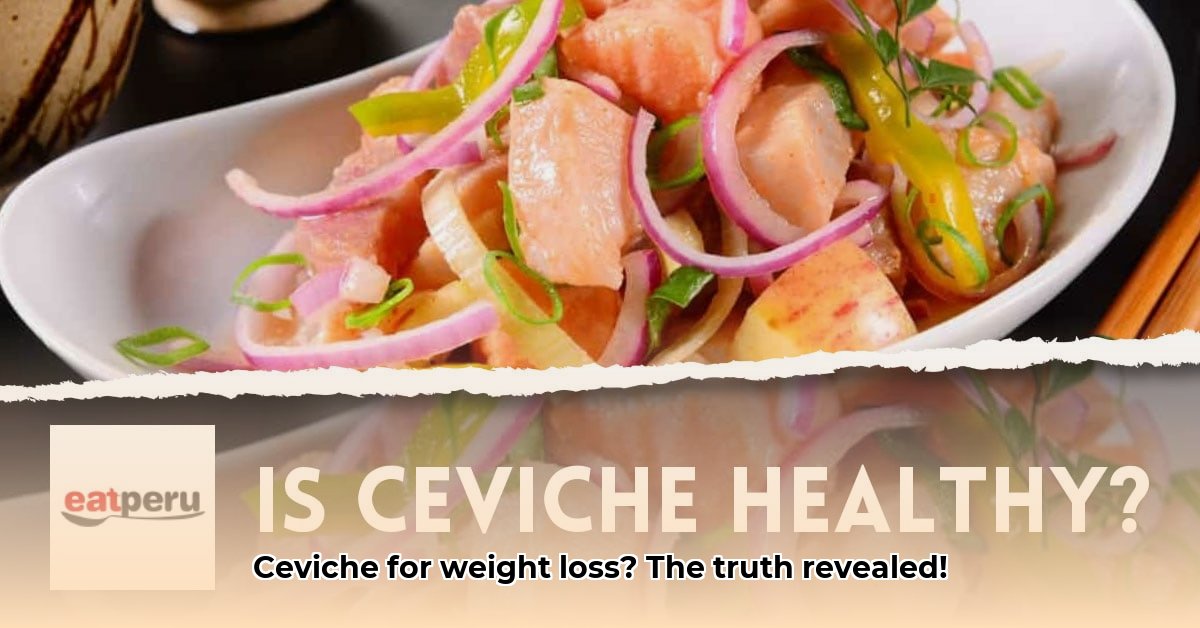
Is Ceviche a Weight-Loss Ally? A Balanced Look
Considering adding ceviche to your weight loss diet? This vibrant South American dish offers a tempting blend of fresh flavors and potential health benefits. But does it truly support your weight loss goals? The answer, like most things related to nutrition, is nuanced. Ceviche can be part of a healthy weight-loss plan, but understanding its nutritional profile, potential risks, and preparation methods is crucial. This article will provide a balanced perspective, equipping you with the knowledge to make informed choices.
Understanding the Nutritional Landscape of Ceviche
A typical serving of ceviche (approximately 100 grams) contains roughly 115-170 calories, making it a relatively low-calorie option compared to many other protein sources. This low calorie density is a significant advantage for those watching their caloric intake. The protein content, vital for satiety and muscle maintenance, contributes to a feeling of fullness, potentially reducing overall food consumption. Added benefits include vitamins like B12 (important for energy production) and C (essential for immune function), and omega-3 fatty acids (beneficial for cardiovascular health). However, this nutritional profile is largely dependent on ingredient choices and portion control.
Is the high protein in ceviche enough to justify using it in a weight loss diet? The protein's role in satiety certainly aids weight management, but it's not a stand-alone solution. A balanced approach is key.
Navigating the Potential Downsides
While ceviche offers nutritional advantages, potential drawbacks exist. The primary concern revolves around food safety. Because the dish features raw fish, the risk of foodborne illness is real if proper handling and preparation protocols aren't followed meticulously. While the acidic marinade's antimicrobial properties help reduce some bacterial risks, it's not a complete safeguard against contamination. Using only the freshest, highest-quality, sushi-grade fish is paramount.
Another critical factor is the variability in caloric content. The addition of high-calorie ingredients like creamy avocado or generous amounts of olive oil can dramatically increase the overall calorie count, negating the initial low-calorie advantage. Portion control, therefore, becomes an indispensable aspect of incorporating ceviche into a weight-loss regime.
Making Ceviche Work for Your Weight Loss Goals
The success of incorporating ceviche into a weight-loss strategy hinges on conscious choices and mindful preparation. Here's a strategic approach:
1. Strategic Ingredient Selection: Prioritizing Quality and Leanness
- Fish Selection: Opt for lean fish like snapper, sea bass, or tilapia. Avoid fatty fish such as salmon, which significantly increases calorie density. Always prioritize sushi-grade fish to minimize food safety risks.
- Amplifying Vegetables: Incorporate ample vegetables – onions, bell peppers, cilantro, etc. – to boost nutrient intake while keeping the calorie count low.
- Moderation with Extras: Use avocado and olive oil sparingly, recognizing their potential to escalate the calorie count.
2. Portion Control: Mastering the Art of Moderation
- Precise Measurement: Utilize measuring cups and scales to maintain accurate portion sizes.
- Mindful Eating: Pay close attention to your body's hunger and satiety cues. Stop eating when comfortably full.
- Integrated Approach: Ceviche is best integrated into a larger, balanced meal plan, not used as the sole source of nutrition.
3. Food Safety: A Non-Negotiable Priority
- Fish Freshness: Always inspect the fish for signs of freshness. A strong fishy smell indicates spoilage.
- Proper Refrigeration: Store ceviche immediately in the refrigerator.
- Recipe Adherence: Follow trusted recipes diligently, paying close attention to safety instructions. Consider lightly cooking the fish before marinating to further mitigate risk.
4. The Empowering Choice: Homemade Ceviche
Preparing ceviche at home offers unparalleled control over ingredients, portion sizes, and food safety. This approach empowers you to create a dish that is both delicious and perfectly aligned with your weight loss goals.
The Final Verdict: Ceviche as Part of a Holistic Approach
Ceviche can be a valuable asset in a comprehensive weight-loss plan, offering a nutritious, satisfying, and flavorful meal option. However, it's not a magic bullet. Successful weight loss requires a multifaceted approach, encompassing balanced nutrition, regular exercise, and mindful eating habits. Ceviche, used responsibly and within a wider strategy, can assist in your journey, but it’s simply one tool in a comprehensive toolkit.
"Sustainable weight loss isn't about eliminating enjoyment; it's about making informed choices," notes Dr. Emily Carter, Registered Dietitian at the University of California, San Francisco. Savoring your food mindfully is also important.
Key Takeaways:
- Ceviche's low calorie density and high protein content can be beneficial for weight loss.
- Prioritizing food safety through careful ingredient selection and preparation is critical.
- Calorie content varies considerably; portion control is paramount.
- Combining ceviche with a balanced diet and exercise program maximizes its benefits.